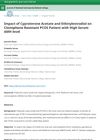 October 2004 in “DOAJ (DOAJ: Directory of Open Access Journals)”
October 2004 in “DOAJ (DOAJ: Directory of Open Access Journals)” Men with hair loss don't necessarily have higher levels of the hormone DHEA-S, but this hormone tends to decrease with age.
 16 citations,
April 2007 in “Journal of Obstetrics and Gynaecology Research”
16 citations,
April 2007 in “Journal of Obstetrics and Gynaecology Research” Prostate-specific antigen may be a new marker for excess male hormones in women with polycystic ovary syndrome.
 11 citations,
January 2011 in “Turkish Journal of Medical Sciences”
11 citations,
January 2011 in “Turkish Journal of Medical Sciences” Low iron levels are a significant risk factor for hair loss, while high vitamin D levels might be a response to hair loss, not a cause.
 June 2024 in “Benha Journal of Applied Sciences”
June 2024 in “Benha Journal of Applied Sciences” Serum IMA levels may be linked to premature hair graying and erectile dysfunction.
 7 citations,
August 2017 in “European Journal of Obstetrics & Gynecology and Reproductive Biology”
7 citations,
August 2017 in “European Journal of Obstetrics & Gynecology and Reproductive Biology” Lower vaspin levels in the blood may indicate a better response to fertility treatment in women with PCOS.
 14 citations,
June 2015 in “Toxicology and Industrial Health”
14 citations,
June 2015 in “Toxicology and Industrial Health” Low doses of BPA can increase prostate growth and change hormone levels in adult rats.
 17 citations,
February 2003 in “Australasian Journal of Dermatology”
17 citations,
February 2003 in “Australasian Journal of Dermatology” Hair loss in postmenopausal woman caused by ovarian issue.
 13 citations,
June 1989 in “Pediatric clinics of North America/The Pediatric clinics of North America”
13 citations,
June 1989 in “Pediatric clinics of North America/The Pediatric clinics of North America” The conclusion is that young women with excessive hair growth should be quickly tested for hormonal issues and treated to improve their social well-being.
 4 citations,
April 2020 in “Journal of Cosmetic Dermatology”
4 citations,
April 2020 in “Journal of Cosmetic Dermatology” Low vitamin D levels are linked to different types of hair loss.
 42 citations,
February 1985 in “Journal of the American Academy of Dermatology”
42 citations,
February 1985 in “Journal of the American Academy of Dermatology” Excessive hair growth can be assessed by history, exam, and blood tests, and treated with medication like dexamethasone, birth control pills, and spironolactone.
 5 citations,
April 2021 in “Journal of Endocrinological Investigation”
5 citations,
April 2021 in “Journal of Endocrinological Investigation” Higher DHT levels are linked to fewer hypogonadism symptoms in men with normal testosterone levels.
 1 citations,
September 2012 in “Expert Review of Endocrinology & Metabolism”
1 citations,
September 2012 in “Expert Review of Endocrinology & Metabolism” Androgen replacement therapy can improve libido and mood in women with severe androgen deficiency, but more research is needed on its long-term safety.
 2 citations,
April 2019 in “Acta medica Philippina/Acta Medica Philippina”
2 citations,
April 2019 in “Acta medica Philippina/Acta Medica Philippina” People with alopecia areata often have lower vitamin D levels than healthy people.
 176 citations,
August 2000 in “The Journal of clinical endocrinology and metabolism/Journal of clinical endocrinology & metabolism”
176 citations,
August 2000 in “The Journal of clinical endocrinology and metabolism/Journal of clinical endocrinology & metabolism” Hormone treatments in transsexual individuals reduce hair growth and oil production in male-to-females and increase them in female-to-males.
 7 citations,
January 2022 in “Evidence-based complementary and alternative medicine”
7 citations,
January 2022 in “Evidence-based complementary and alternative medicine” Ginger supplements helped reduce symptoms and improve metabolic health in hypothyroid patients.
 January 2021 in “Journal of Shaheed Suhrawardy Medical College”
January 2021 in “Journal of Shaheed Suhrawardy Medical College” Cyproterone acetate and ethinylestradiol significantly lowered AMH levels in PCOS patients resistant to clomiphene.
 11 citations,
March 2016 in “Translational Andrology and Urology”
11 citations,
March 2016 in “Translational Andrology and Urology” Nandrolone might increase muscle mass with fewer side effects than testosterone but could cause erectile dysfunction and needs more research.
 9 citations,
March 2019 in “European Journal of Sport Science”
9 citations,
March 2019 in “European Journal of Sport Science” New signs like changes in blood markers, physical symptoms, and behavioral shifts may help detect hidden steroid use in athletes.
 91 citations,
December 2017 in “Systems Biology in Reproductive Medicine”
91 citations,
December 2017 in “Systems Biology in Reproductive Medicine” Lower SHBG levels may increase the risk of PCOS.
 36 citations,
January 2017 in “Journal of Obstetrics and Gynaecology Research”
36 citations,
January 2017 in “Journal of Obstetrics and Gynaecology Research” The review found no clear link between vitamin D receptor gene variations and polycystic ovary syndrome.
 5 citations,
April 2014 in “European Journal of Obstetrics & Gynecology and Reproductive Biology”
5 citations,
April 2014 in “European Journal of Obstetrics & Gynecology and Reproductive Biology” AMH levels can't reliably tell the difference between LOCAH and all types of PCOS in women with excessive hair growth.
 1 citations,
December 2017 in “Journal of The European Academy of Dermatology and Venereology”
1 citations,
December 2017 in “Journal of The European Academy of Dermatology and Venereology” Vertex baldness has higher DHT levels than frontal baldness, but testosterone and PSA levels are similar.
 73 citations,
June 2008 in “The Journal of Clinical Endocrinology and Metabolism”
73 citations,
June 2008 in “The Journal of Clinical Endocrinology and Metabolism” Polycystic ovarian shape is a genetic sign of PCOS and its hormonal and metabolic features can be inherited.
 44 citations,
March 2008 in “European journal of endocrinology”
44 citations,
March 2008 in “European journal of endocrinology” Women with PCOS have lower ghrelin levels and a weaker response to sugar, which might affect their feeling of fullness and lead to overeating.
 October 2007 in “Postgraduate obstetrics & gynecology”
October 2007 in “Postgraduate obstetrics & gynecology” Testosterone therapy can help with androgen deficiency in women but should be used with caution and monitoring due to potential risks.
 2 citations,
May 2022 in “Diagnostics”
2 citations,
May 2022 in “Diagnostics” Vitamin D levels in hair don't match those in blood, so hair isn't a reliable indicator of Vitamin D status.
 1 citations,
January 2016 in “International journal of reproduction, contraception, obstetrics and gynecology”
1 citations,
January 2016 in “International journal of reproduction, contraception, obstetrics and gynecology” Hypothyroidism may worsen metabolic problems like insulin resistance and obesity in women with PCOS.
110 citations,
November 1984 in “The American Journal of Medicine” A genetic defect in vitamin D receptors causes severe rickets and hair loss in children, but some heal as they age.
20 citations,
January 2019 in “International journal of trichology” People with Alopecia areata often have lower Vitamin D levels, which might affect the severity of their condition.
 January 2008 in “Pratique médicale & chirurgicale de l'animal de compagnie”
January 2008 in “Pratique médicale & chirurgicale de l'animal de compagnie” Alopecia X in dogs is a cosmetic issue, not a hormonal disorder, and harmful treatments should be avoided.




























